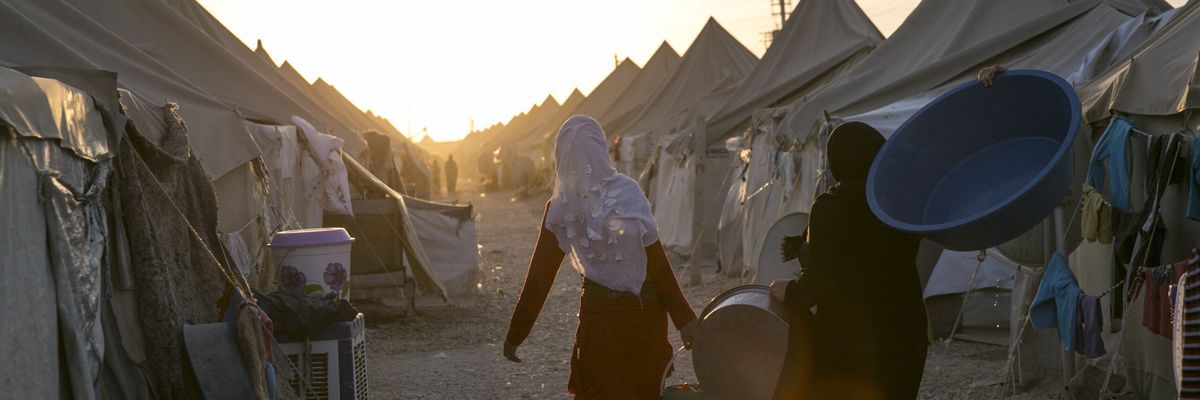The United States is the largest single donor of humanitarian aid to… .” Googling that phrase brings up results for a litany of countries: Ethiopia, Afghanistan, Nigeria, Syria, Yemen. The list goes on and on and it's language often used within the context of discussing a dire mass atrocity or the threat of one, as a generous contribution that is the best the United States can do.
From Afghanistan to Tigray to Guatemala, the U.S. government has sought to bandage the impacts of its own policies — or its partners’ — through aid rather than accountability. Policymakers in Washington may applaud themselves for their generosity, but in reality no amount of humanitarian assistance can resolve the intractable conflicts and climate shocks that the United States has helped create or enable.
Humanitarian assistance is an emergency failsafe, not a solution to human suffering. Theoretically, humanitarian assistance is offered as the last resort once other systems have failed, or in response to an unexpected disaster. Increasingly, however, humanitarian assistance is being offered as what the United States can do in a challenging situation, often ignoring how its other militaristic policies are helping to create or exacerbate this suffering in the first place.
Moreover, the United States and most other Global North countries employ humanitarian assistance as a response to underlying drivers to instability — it does not seek to address or prevent the underlying conflict itself. Too often, from Burma to Syria, the international community ignored obvious indicators of potential conflict and economic instability, continuing with business as usual until violence erupts. When a crisis occurs, international humanitarian interventions at that point — while important — have limited impact, especially if it is the sole intervention or it remains government to government or INGO focused. Humanitarian assistance can help people survive when the government has failed, but it is not in itself a solution.
In more cases than not over the last 20 years (and beyond), the United States — or its client military allies — have helped create or exacerbate the humanitarian nightmares their assistance seeks to alleviate. For years the Obama administration, and later even the Trump administration, continued to donate and commit millions in humanitarian assistance to alleviate the suffering Yemen and Syria, for example. It did so while failing to engage in (or actively resisting) diplomacy to resolve these post-revolutionary conflicts, in favor of arming, equipping, and assisting belligerents. It’s like providing the gas and matches for arson and then throwing a few buckets of water on the ensuing fire — with no justice for those burned and killed in the process.
It’s not just U.S. military interventions that help create the need for humanitarian assistance. Crippling U.S. sectoral sanctions — and in some cases layered sanctions regimes that amount to embargos as is currently the case in Afghanistan, North Korea, Iran, and Cuba to name a few — drive humanitarian suffering and economic collapse. In the case of the previous administration, that collapse was even the point of its sanctions policies, hitched to its overriding regime change fever dreams in Iran. In Afghanistan, the Biden administration is even holding hostage the savings of private Afghan citizens to seemingly punish the Taliban, literally starving people to avoid having to address a not unexpected outcome of the U.S. military occupation.
Even in countries not in armed conflict, these policies have multiorder effects on civilians. These sanctions not only cut people off from the outside, disrupting education, freedom of movement, and access to life-saving remittances and medical care, but also feed the very corruption and hardline policies Washington purports to oppose. Moreover, the United States is required to create specific exemptions so that humanitarians, let alone peacebuilders and healthcare practitioners, can even deliver the humanitarian assistance the United States is so committed to providing. Wouldn’t a better policy be a more pragmatic one that engages with the limits of U.S. power to dictate outcomes, and instead focuses on ways it can help — or at very least not harm — working people who already face unimaginable situations?
Humanitarian assistance is necessary given the direness of these crises, no doubt. And such an approach wouldn’t be a silver bullet in such circumstances. Yet the very colonial nature of humanitarian and other foreign assistance further undermines any local agency and ownership of how “aid” is implemented — much like policies that arms, and thereby empowers, certain groups over others. The United States is stuck in a cycle of ignoring how its foreign policy more broadly fuels civil conflicts and failed states, and trying to fix “unexpected” crises with humanitarian aid.
It’s not to say the United States is powerless in these situations or that it should stop providing humanitarian assistance. Even in places where Washington may not have much influence outside of humanitarian assistance and diplomatic entreaties, however, a closer look at the conflict dynamic can often reveal otherwise. Take Tigray, for example. It is true that this long-simmering conflict has little to do with the United States. But it does have to do with the United States aimlessly backing the United Arab Emirates’ increasingly interventionist and antidemocratic foreign policy, which includes arming the Ethiopian government with drones and even conducting civilian-killing drones strikes in Tigray (a practice with roots in Yemen, Libya, and Sudan). A primary focus on emergency assistance, however, fails to capitalize on the potential impact of creating tangible pressure the UAE — including refraining from additional bilateral arms sales on this basis — to end its involvement in the conflict and push for deescalation.
While such an approach wouldn’t be a silver bullet, this failure of accountability, of ignoring that a policy or partner is undermining the strategic interest of preventing famine and mass atrocities, reinforces cycles of impunity that drive further death and destruction — and the manmade need for more humanitarian assistance.
















